Unit 3 Could you please clean your room?Section B (2a-2e) 课件(共39张PPT无素材)
文档属性
| 名称 | Unit 3 Could you please clean your room?Section B (2a-2e) 课件(共39张PPT无素材) |  | |
| 格式 | ppt | ||
| 文件大小 | 1.0MB | ||
| 资源类型 | 教案 | ||
| 版本资源 | 人教新目标(Go for it)版 | ||
| 科目 | 英语 | ||
| 更新时间 | 2022-04-08 12:56:22 | ||
图片预览

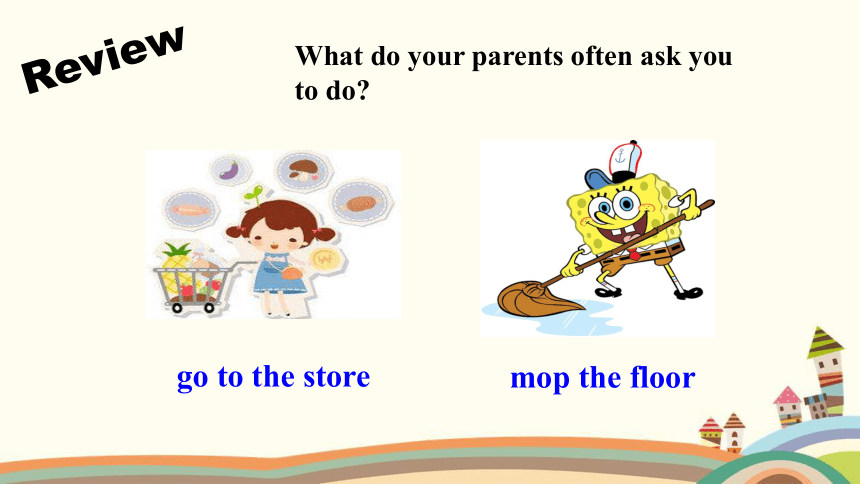

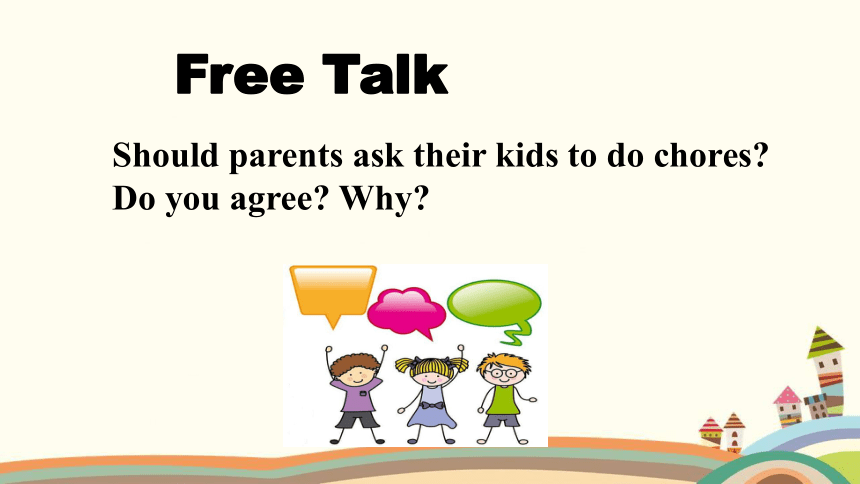
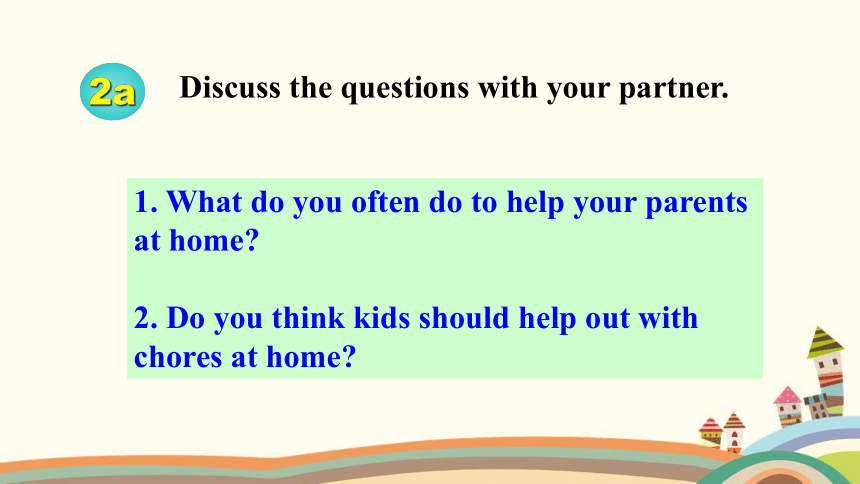
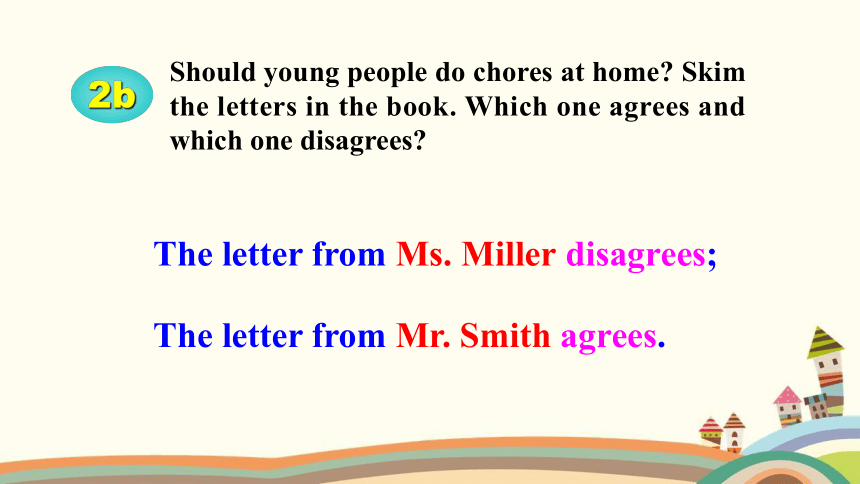
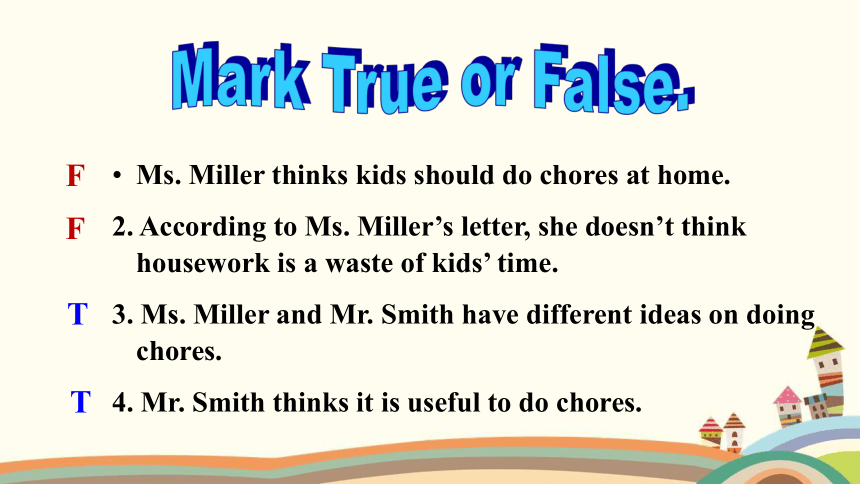
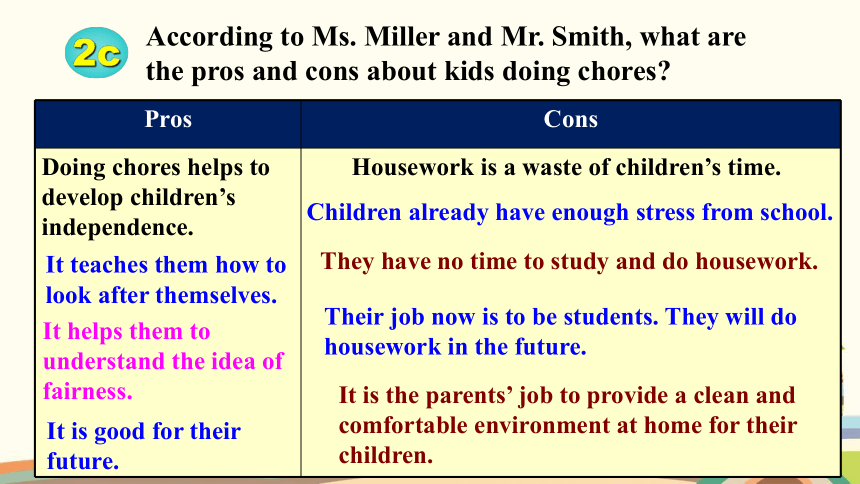
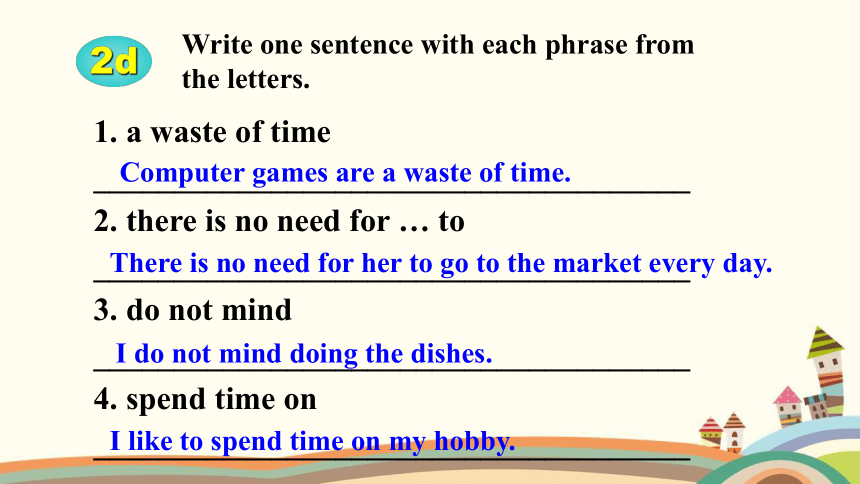
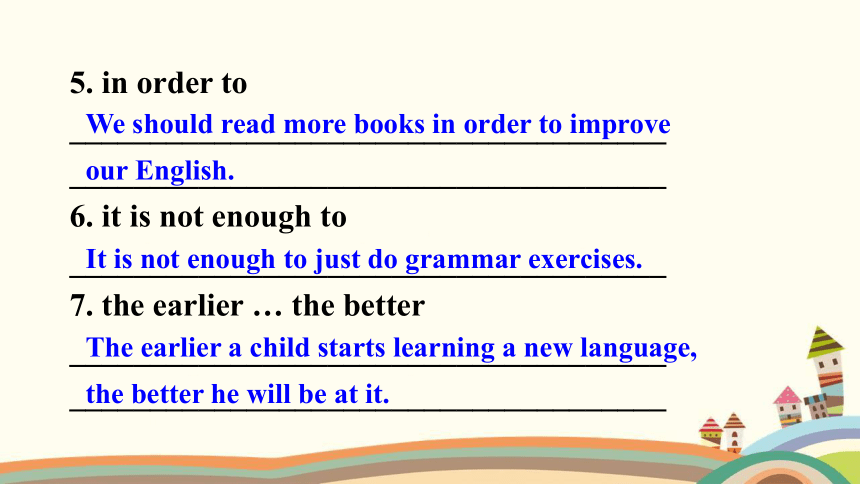
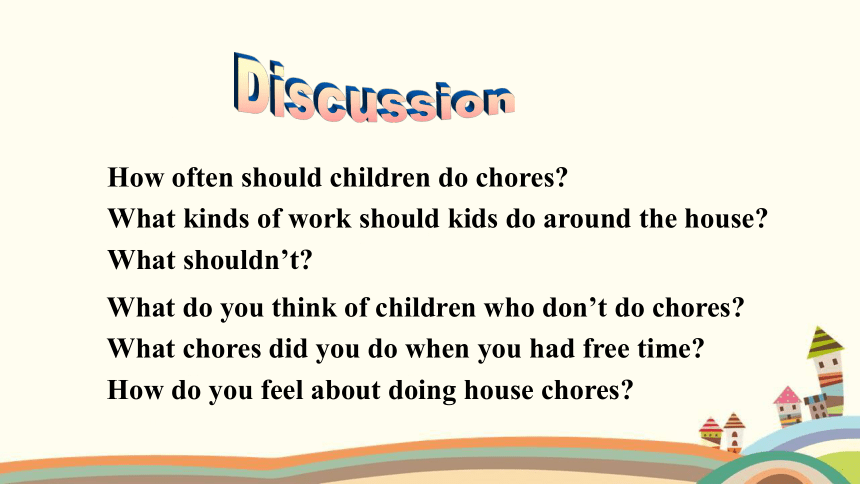
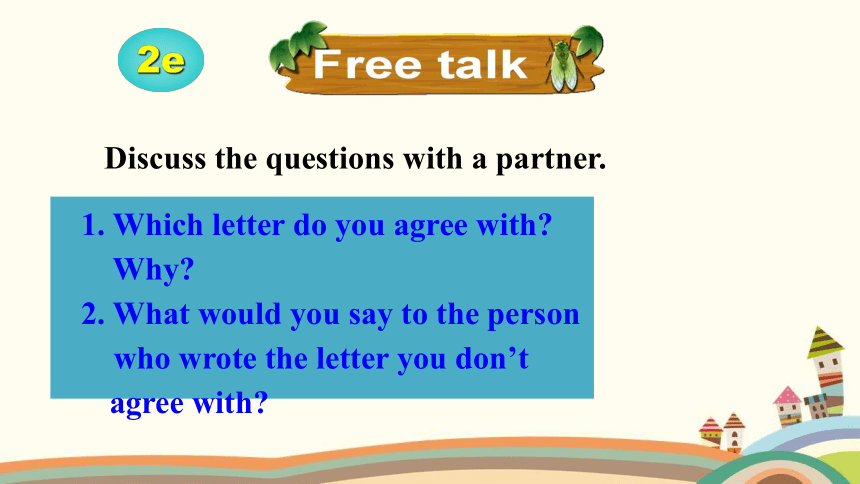
文档简介
(共39张PPT)
mop the floor
Review
What do your parents often ask you to do
go to the store
Review
What do you often ask your parents permission for
invite friends to a party
buy some drinks and snacks
Should parents ask their kids to do chores
Do you agree Why
Free Talk
Discuss the questions with your partner.
2a
1. What do you often do to help your parents at home
2. Do you think kids should help out with chores at home
2b
Should young people do chores at home Skim the letters in the book. Which one agrees and which one disagrees
The letter from Ms. Miller disagrees;
The letter from Mr. Smith agrees.
Ms. Miller thinks kids should do chores at home.
2. According to Ms. Miller’s letter, she doesn’t think housework is a waste of kids’ time.
3. Ms. Miller and Mr. Smith have different ideas on doing chores.
4. Mr. Smith thinks it is useful to do chores.
F
F
T
T
2c
According to Ms. Miller and Mr. Smith, what are the pros and cons about kids doing chores
Pros Cons
Doing chores helps to develop children’s independence.
Housework is a waste of children’s time.
It teaches them how to look after themselves.
Children already have enough stress from school.
It helps them to understand the idea of fairness.
It is good for their future.
They have no time to study and do housework.
Their job now is to be students. They will do housework in the future.
It is the parents’ job to provide a clean and comfortable environment at home for their children.
2d
Write one sentence with each phrase from the letters.
1. a waste of time
_____________________________________
2. there is no need for … to
_____________________________________
3. do not mind
_____________________________________
4. spend time on
_____________________________________
Computer games are a waste of time.
There is no need for her to go to the market every day.
I do not mind doing the dishes.
I like to spend time on my hobby.
5. in order to
_____________________________________
_____________________________________
6. it is not enough to
_____________________________________
7. the earlier … the better
_____________________________________
_____________________________________
We should read more books in order to improve our English.
It is not enough to just do grammar exercises.
The earlier a child starts learning a new language, the better he will be at it.
How often should children do chores
What kinds of work should kids do around the house What shouldn’t
What do you think of children who don’t do chores
What chores did you do when you had free time
How do you feel about doing house chores
2e
Discuss the questions with a partner.
1. Which letter do you agree with
Why
2. What would you say to the person
who wrote the letter you don’t agree with
Do you think kids should help out with chores
at home.
help (sb.) out (with sth.) 给予帮助
You never help out around the house.
你从不帮忙干家务。
Can you help me out
你能帮我一把吗?
help … with … 帮助……(做)……
help … do … 帮助……做……
He often helps me with my English.
= He often helps me study English.
他经常帮助我学习英语。
拓 展
help sb. (to) do sth. 帮助某人做某事
Can you help me (to) learn English
你能帮助我学英语吗?
help oneself (to) 自用/ 请随意吃 (……)
Help yourself to the fish. 请随便吃鱼。
be of some / no / much help to sb. (名词)对某人有些 / 没有 / 很有帮助
This book is of great help to me.
这本书对我很有帮助。
2. They should spend their time on schoolwork in order to get …
spend v. 度过,花费
I spent two hours on this maths problem.
这道数学题花了我两个小时的时间。
They spent two years (in) building this bridge.
他们花了两年的时间建造这座桥。
spend 的主语通常是人
常用的搭配有:
spend some time / money on sth.
在……上花费时间(金钱)
spend some time / money (in) doing sth.
花费时间(金钱)做某事(in可以省略)
辨析
表示“花费”的词,除了spend外,还有take,pay与cost。
cost的主语通常是物或某项活动。如:
This computer cost me a lot of money.
这台电脑花了我很多钱。
take的主语通常是it或某项活动。
It takes / took sb. some time to do sth.
“做某事花了某人多少时间”。如:
It took them three years to finish the programme.
他们用了三年时间才完成这个项目。
pay的主语一般是人, 基本用法是:
pay +名( 人)+名(款)+(for名)
= pay +名(款)+to名(人)+(for 名)
为了(某事,物)付(款)给(某人)
Did you pay him 100 dollars for that old bike
= Did you pay 100 dollars to him for that old bike
你付给他100 美元买他那辆旧自行车了吗?
pay for sth. 付……的钱
pay for sb. 替某人付钱
pay sb. 付钱给某人
pay money back 还钱
pay off one’s money还清钱
in order to 后接动词原形,表示目的,意思是“为了……”。如:
He got up early in order to catch the first bus.
他起得很早,为了赶上头班车。
He works very hard in order to catch up with others.
为了赶上别人,他努力学习。
3. It is the parents’ job to provide a clean and comfortable …
It为形式主语, 动词不定式to provide … 才是真正的主语。
It is one’s job (duty …) to do sth. 做某事是某人的工作(职责等)
It’s every teacher’s job to explain things clearly to the students. 把东西给学生讲明白是一位老师应该做的。
provide作及物动词,意思为“提供”, 其后可跟双宾语, 即provide sb. sth. 表示“给某人提供某物”,
也可说成provide sb. with sth. 或provide sth. for sb.。
这三种表达法可进行同义句转换。如:
The rich man wants to provide the poor children some necessary books and stationery.
这位有钱人想给贫困的孩子们提供一些必要的书籍和文具。
They provided the visitors with lots of information.
他们为参观者提供了大量的信息。
provide, give都有“给” 的意思,其区别是:
give指无需偿还地把金钱、物品、时间、麻烦等有形或无形的东西“送给、授予、供给”某人;
provide主要指为某人、某物或某事“提供、供应”某物品, 尤指生活必需品。例如:
I would like to give him a chance.
我想给他一个机会。
4. And anyway, … I do not mind doing them.
anyway adv. 反正;仍然;依然
Sam didn’t get the job, but he’s not unhappy because it didn’t pay well anyway.
萨姆没有得到那份工作,但他并没有闷闷不乐,反正薪酬也不算高。
anyway 还可表示“不管怎样,无论如何”。
I am coming anyway, no matter what you say.
不管你怎么说,我无论如何都要来。
I don’t think they need help, but I think I should offer anyway.
我认为他们无须帮助,不过我想我应有所表示。
mind doing sth. 介意做某事
Do you mind helping us
请你帮我们一下忙好吗
make up one’s mind 决定,决心
change one’s mind 改变主意
never mind 别介意
5. … depend on their parents too much.
depend v. 依赖;依靠
depend on 依赖;依靠
Children depend on their parents for food and clothing.
小孩依赖他们的父母供给衣食。
We depend on the radio for news.
我们靠收音机听新闻。
6. … helps to develop children’s independence …
develop v. 发展;壮大
We must do our best to develop the national economy.
我们必须努力发展国民经济。
A small seed can develop into a tall tree.
一粒小小的种子能长成一棵大树。
development n. 发展;生长;进展
7. Since they live in our house with their parents …
since conj. 因为,既然,由于 (引导原因状语从句)
Since you are so sure of it, he'll believe you.
既然你对此这么有把握,他会相信你的。
Since you can’t answer the question, perhaps we'd better ask someone else.
既然你无法回答这个问题,我们最好再问问别人。
辨析
because, since作连词均含有“因为”之意。
because的语意强,着重直接的原因或理由,所引出的从句是全句的重心,用以回答why提出的问题。
since语意比because弱,一般用于表示“由于大家已知的事实”。
take care of “照看;照顾”,相当于 look after,其后可直接接名词或代词作宾语。
He’s old enough to take care of himself.
他长大了,能照顾自己了。
take care 当心;保重
You must take care in busy city streets.
在繁忙的城市街道上你必须要当心。
8. … how to take care of themselves.
9. As a result, he often fell ill and his grades dropped.
as a result “结果”,后面接的内容表示结果;
as a result of “……的结果,由于”,后面接的内容表示原因,相当于because of。如:
He didn’t work hard. As a result, he failed his exam.
As a result, Audrey Hepburn won an Oscar for Best Actress for her role in the film Rom an Holiday.
We had to stay at home as a result of the heavy rain.
As a result of the earthquakes, thousands of Japanese lost their homes.
ill adj. 生病的
He looks ill these days.
近来,他气色不好。
ill多与系动词be, feel, become, fall, get, be taken 等搭配,用做表语。
sick & ill
两者都可表示“有病的”:作定语时通常用sick;作表语时可用 ill(英) 或 sick (美)。
如:a sick man 病人 be ill / sick 生病
2. ill 表示“有病的”时,一般不用作定语,但当它表示“坏的(=bad)”、“有害的(= harmful)”等义时,却只能作定语,不能作表语。
如:ill news 坏消息 ill luck 运气不好 ill health 身体不好
辨析
3. 表示“病人”,通常用 the sick (相当于名词 ,具有复数意义),而不用 the ill。
如:They have come to see the sick. 他们已来看望过病人。
the + 比较级 + …, the + 比较级+ … 越 …, 就越…
The more he explained, the better we understood.
他解释的越多,我们就越理解。
Many people believe that the more a person reads, the wiser he will become.
很多人相信一个人书读得越多就会变得越聪明。
10. The earlier kids learn to be independent, the better it is for their future.
1. Do the other exercises.
mop the floor
Review
What do your parents often ask you to do
go to the store
Review
What do you often ask your parents permission for
invite friends to a party
buy some drinks and snacks
Should parents ask their kids to do chores
Do you agree Why
Free Talk
Discuss the questions with your partner.
2a
1. What do you often do to help your parents at home
2. Do you think kids should help out with chores at home
2b
Should young people do chores at home Skim the letters in the book. Which one agrees and which one disagrees
The letter from Ms. Miller disagrees;
The letter from Mr. Smith agrees.
Ms. Miller thinks kids should do chores at home.
2. According to Ms. Miller’s letter, she doesn’t think housework is a waste of kids’ time.
3. Ms. Miller and Mr. Smith have different ideas on doing chores.
4. Mr. Smith thinks it is useful to do chores.
F
F
T
T
2c
According to Ms. Miller and Mr. Smith, what are the pros and cons about kids doing chores
Pros Cons
Doing chores helps to develop children’s independence.
Housework is a waste of children’s time.
It teaches them how to look after themselves.
Children already have enough stress from school.
It helps them to understand the idea of fairness.
It is good for their future.
They have no time to study and do housework.
Their job now is to be students. They will do housework in the future.
It is the parents’ job to provide a clean and comfortable environment at home for their children.
2d
Write one sentence with each phrase from the letters.
1. a waste of time
_____________________________________
2. there is no need for … to
_____________________________________
3. do not mind
_____________________________________
4. spend time on
_____________________________________
Computer games are a waste of time.
There is no need for her to go to the market every day.
I do not mind doing the dishes.
I like to spend time on my hobby.
5. in order to
_____________________________________
_____________________________________
6. it is not enough to
_____________________________________
7. the earlier … the better
_____________________________________
_____________________________________
We should read more books in order to improve our English.
It is not enough to just do grammar exercises.
The earlier a child starts learning a new language, the better he will be at it.
How often should children do chores
What kinds of work should kids do around the house What shouldn’t
What do you think of children who don’t do chores
What chores did you do when you had free time
How do you feel about doing house chores
2e
Discuss the questions with a partner.
1. Which letter do you agree with
Why
2. What would you say to the person
who wrote the letter you don’t agree with
Do you think kids should help out with chores
at home.
help (sb.) out (with sth.) 给予帮助
You never help out around the house.
你从不帮忙干家务。
Can you help me out
你能帮我一把吗?
help … with … 帮助……(做)……
help … do … 帮助……做……
He often helps me with my English.
= He often helps me study English.
他经常帮助我学习英语。
拓 展
help sb. (to) do sth. 帮助某人做某事
Can you help me (to) learn English
你能帮助我学英语吗?
help oneself (to) 自用/ 请随意吃 (……)
Help yourself to the fish. 请随便吃鱼。
be of some / no / much help to sb. (名词)对某人有些 / 没有 / 很有帮助
This book is of great help to me.
这本书对我很有帮助。
2. They should spend their time on schoolwork in order to get …
spend v. 度过,花费
I spent two hours on this maths problem.
这道数学题花了我两个小时的时间。
They spent two years (in) building this bridge.
他们花了两年的时间建造这座桥。
spend 的主语通常是人
常用的搭配有:
spend some time / money on sth.
在……上花费时间(金钱)
spend some time / money (in) doing sth.
花费时间(金钱)做某事(in可以省略)
辨析
表示“花费”的词,除了spend外,还有take,pay与cost。
cost的主语通常是物或某项活动。如:
This computer cost me a lot of money.
这台电脑花了我很多钱。
take的主语通常是it或某项活动。
It takes / took sb. some time to do sth.
“做某事花了某人多少时间”。如:
It took them three years to finish the programme.
他们用了三年时间才完成这个项目。
pay的主语一般是人, 基本用法是:
pay +名( 人)+名(款)+(for名)
= pay +名(款)+to名(人)+(for 名)
为了(某事,物)付(款)给(某人)
Did you pay him 100 dollars for that old bike
= Did you pay 100 dollars to him for that old bike
你付给他100 美元买他那辆旧自行车了吗?
pay for sth. 付……的钱
pay for sb. 替某人付钱
pay sb. 付钱给某人
pay money back 还钱
pay off one’s money还清钱
in order to 后接动词原形,表示目的,意思是“为了……”。如:
He got up early in order to catch the first bus.
他起得很早,为了赶上头班车。
He works very hard in order to catch up with others.
为了赶上别人,他努力学习。
3. It is the parents’ job to provide a clean and comfortable …
It为形式主语, 动词不定式to provide … 才是真正的主语。
It is one’s job (duty …) to do sth. 做某事是某人的工作(职责等)
It’s every teacher’s job to explain things clearly to the students. 把东西给学生讲明白是一位老师应该做的。
provide作及物动词,意思为“提供”, 其后可跟双宾语, 即provide sb. sth. 表示“给某人提供某物”,
也可说成provide sb. with sth. 或provide sth. for sb.。
这三种表达法可进行同义句转换。如:
The rich man wants to provide the poor children some necessary books and stationery.
这位有钱人想给贫困的孩子们提供一些必要的书籍和文具。
They provided the visitors with lots of information.
他们为参观者提供了大量的信息。
provide, give都有“给” 的意思,其区别是:
give指无需偿还地把金钱、物品、时间、麻烦等有形或无形的东西“送给、授予、供给”某人;
provide主要指为某人、某物或某事“提供、供应”某物品, 尤指生活必需品。例如:
I would like to give him a chance.
我想给他一个机会。
4. And anyway, … I do not mind doing them.
anyway adv. 反正;仍然;依然
Sam didn’t get the job, but he’s not unhappy because it didn’t pay well anyway.
萨姆没有得到那份工作,但他并没有闷闷不乐,反正薪酬也不算高。
anyway 还可表示“不管怎样,无论如何”。
I am coming anyway, no matter what you say.
不管你怎么说,我无论如何都要来。
I don’t think they need help, but I think I should offer anyway.
我认为他们无须帮助,不过我想我应有所表示。
mind doing sth. 介意做某事
Do you mind helping us
请你帮我们一下忙好吗
make up one’s mind 决定,决心
change one’s mind 改变主意
never mind 别介意
5. … depend on their parents too much.
depend v. 依赖;依靠
depend on 依赖;依靠
Children depend on their parents for food and clothing.
小孩依赖他们的父母供给衣食。
We depend on the radio for news.
我们靠收音机听新闻。
6. … helps to develop children’s independence …
develop v. 发展;壮大
We must do our best to develop the national economy.
我们必须努力发展国民经济。
A small seed can develop into a tall tree.
一粒小小的种子能长成一棵大树。
development n. 发展;生长;进展
7. Since they live in our house with their parents …
since conj. 因为,既然,由于 (引导原因状语从句)
Since you are so sure of it, he'll believe you.
既然你对此这么有把握,他会相信你的。
Since you can’t answer the question, perhaps we'd better ask someone else.
既然你无法回答这个问题,我们最好再问问别人。
辨析
because, since作连词均含有“因为”之意。
because的语意强,着重直接的原因或理由,所引出的从句是全句的重心,用以回答why提出的问题。
since语意比because弱,一般用于表示“由于大家已知的事实”。
take care of “照看;照顾”,相当于 look after,其后可直接接名词或代词作宾语。
He’s old enough to take care of himself.
他长大了,能照顾自己了。
take care 当心;保重
You must take care in busy city streets.
在繁忙的城市街道上你必须要当心。
8. … how to take care of themselves.
9. As a result, he often fell ill and his grades dropped.
as a result “结果”,后面接的内容表示结果;
as a result of “……的结果,由于”,后面接的内容表示原因,相当于because of。如:
He didn’t work hard. As a result, he failed his exam.
As a result, Audrey Hepburn won an Oscar for Best Actress for her role in the film Rom an Holiday.
We had to stay at home as a result of the heavy rain.
As a result of the earthquakes, thousands of Japanese lost their homes.
ill adj. 生病的
He looks ill these days.
近来,他气色不好。
ill多与系动词be, feel, become, fall, get, be taken 等搭配,用做表语。
sick & ill
两者都可表示“有病的”:作定语时通常用sick;作表语时可用 ill(英) 或 sick (美)。
如:a sick man 病人 be ill / sick 生病
2. ill 表示“有病的”时,一般不用作定语,但当它表示“坏的(=bad)”、“有害的(= harmful)”等义时,却只能作定语,不能作表语。
如:ill news 坏消息 ill luck 运气不好 ill health 身体不好
辨析
3. 表示“病人”,通常用 the sick (相当于名词 ,具有复数意义),而不用 the ill。
如:They have come to see the sick. 他们已来看望过病人。
the + 比较级 + …, the + 比较级+ … 越 …, 就越…
The more he explained, the better we understood.
他解释的越多,我们就越理解。
Many people believe that the more a person reads, the wiser he will become.
很多人相信一个人书读得越多就会变得越聪明。
10. The earlier kids learn to be independent, the better it is for their future.
1. Do the other exercises.
同课章节目录
- Unit 1 What's the matter?
- Section A
- Section B
- Unit 2 I'll help to clean up the city parks.
- Section A
- Section B
- Unit 3 Could you please clean your room?
- Section A
- Section B
- Unit 4 Why don't you talk to your parents?
- Section A
- Section B
- Unit 5 What were you doing when the rainstorm came
- Section A
- Section B
- Review of Units 1-5
- Unit 6 An old man tried to move the mountains.
- Section A
- Section B
- Unit 7 What's the highest mountain in the world?
- Section A
- Section B
- Unit 8 Have you read Treasure Island yet?
- Section A
- Section B
- Unit 9 Have you ever been to a museum?
- Section A
- Section B
- Unit 10 I've had this bike for three years.
- Section A
- Section B
